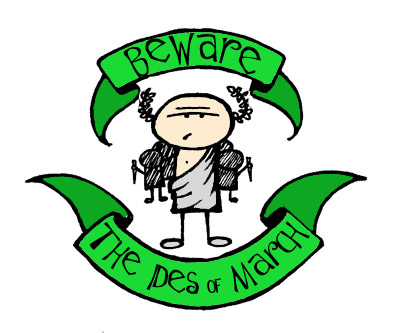The word Ides comes from the Latin word “Idus” and means “half division”
especially in relation to a month. It is a word that was used widely in the
Roman calendar indicating the approximate day that was the middle of the month.
The term
ides was used
for the 15th day of the months of March, May, July, and October, and the 13th
day of the other months.
[1] The
Ides of March was a festive day dedicated to the god
Mars and a military
parade was usually held.
In modern times, the term
Ides of March is best known as the date on
which
Julius Caesar was
killed in
44 B.C. Caesar was stabbed (23 times) to death in the Roman Senate by a group of
conspirators led by
Marcus Junius
Brutus and
Gaius Cassius
Longinus. The group included 60 other co-conspirators according to
Plutarch.
[2]
According to Plutarch, a
seer had foreseen that Caesar would
be harmed not later than the Ides of March and on his way to the
Theatre of Pompey
(where he would be assassinated), Caesar met that seer and joked, “The ides of
March have come”, meaning to say that the prophecy had not been fulfilled, to
which the seer replied “Ay, Caesar; but not gone.”
[3] This
meeting is famously dramatized in
William
Shakespeare‘s play
Julius Caesar,
when Caesar is warned by the
soothsayer to “beware the
Ides of March.”
[4][5]
(Source: Wikipedia)
